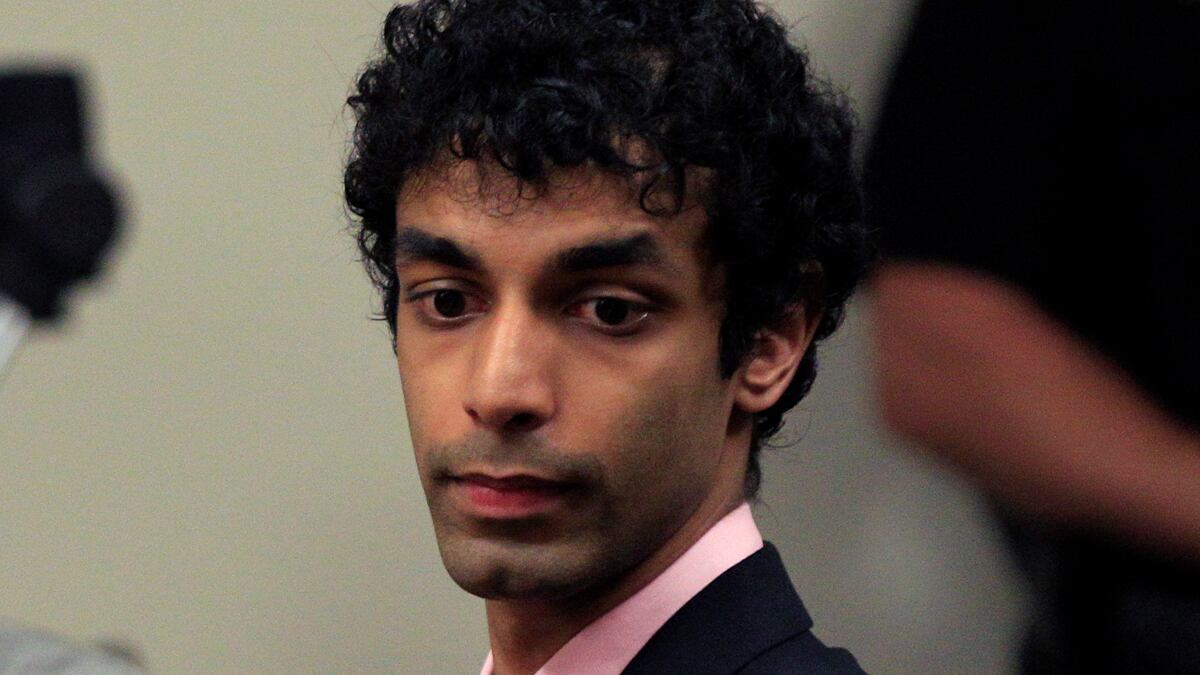I’ll admit it—I was one of those who, during the trial of Dharun Ravi, called for exactly the result that has now transpired: a guilty verdict and a light sentence. Here’s what I wrote on March 12:
The only way out would be a verdict that no one will like: guilty, but with no jail time for “bias intimidation.” This would send the right message while not ruining the life of an average guy who picked on a delicate kid. It would protect hate-crime laws from being undermined by a bad case. And it would acknowledge who’s really on trial in this case: all of us.
Today’s sentence, however, was so light that I imagine many of my LGBT colleagues are about to respond with outrage. The New Jersey hate-crimes law under which Ravi was charged could’ve landed him in prison for up to 10 years. Ravi got 30 days, plus probation and a small fine. And as I predicted, no one likes it. (In Judge Glenn Berman’s words, “I have disenchanted both sides. It is what it is.”)
But before we rage against the ruling, let’s be clear on what this trial was, and was not, about.
First, it was never (legally) about Tyler Clementi’s suicide. Under American law, people are not responsible for every subsequent consequence of their actions. So, for the purposes of understanding Ravi’s sentence, imagine that the suicide didn’t happen. Ravi secretly videotaped Clementi having sex with another man, embarrassed him, and, yes, in some (but not most) of his comments, made a couple of snide references to homosexuality. For that, he received 30 days in jail, three years’ probation, 300 hours of community service, and a $10,000 fine.
That seems like a stiff but appropriate sentence. Judge Berman noted that two of the four counts are punishable only by probation, and that this kind of conduct is not what the New Jersey legislature had in mind when it passed the state’s hate-crimes law.
Nor does this sentence send a message that it’s OK to bully, or that “boys will be boys.” In fact, Clementi was bullied less than most victims of bullying. For example, the recent documentary Bully depicts harassment far worse than what Ravi did to Clementi. Make no mistake—what he did was awful, but, viewed in terms of cold legal facts, it’s not more awful than what goes on in a lot of dorm rooms every day. And he is going to jail.
This brings me to what this case really is about: the limitations of the legal process. Throughout the trial, there have been conflations of Ravi’s crime and the phenomenon of bullying and gay-bashing more generally, of individual justice and the collective need to respond to the grief we should all feel.
But law is, at best, an imperfect instrument of grief and expiation. There should indeed be outrage at the climate of homophobia and bigotry that causes young people to take their own lives, and Ravi is absolutely complicit in that. However, as I wrote in March, so is everyone who reinforces gender norms, makes crude comments, and occasionally even threatens violence against those we perceive to be threatening to our notions of how men and women should be. The ongoing and underreported violence against transgender people (four murders in the last month alone), the institutionalized discrimination against LGBT people, the tolerance that otherwise reasonable people have for the unreasonable, hateful, and harmful rhetoric from fundamentalist religious leaders—these are what we should be condemning today. None of them are counts against Dharun Ravi.

Law is not going to solve social problems of bigotry and homophobia by singling out scapegoats and punishing them for all of our sins. If you are angry that no one is being held responsible for a young man’s suicide, don’t look to the court system—look around, and look in the mirror. Mitt Romney is responsible for it, anti-gay preachers are responsible for it, North Carolina voters are responsible for it and so is Dharun Ravi. So are all of us.
I’m reminded of Bob Dylan’s 1964 song The Lonesome Death of Hattie Carroll, which recounts the murder of an African-American servant by a wealthy white man who was sentenced to six months. Dylan’s point, as relevant now as then, was that individuals operate in systems of social oppression for which we are all responsible. It’s not either/or, it’s both/and: both individual responsibility, which is determined by courts, and collective responsibility, which a court cannot adjudicate. There is bigotry and bias everywhere, and rather than try to put it all on Ravi’s shoulders, we should redouble our efforts to call it when we see it, in our schools, our churches, and our statehouses.
Imagine if we had done that three years ago. Imagine if, when Dharun Ravi videotaped his roommate’s sexual encounter, none of his friends wanted to watch, and Tyler Clementi had a support system—not just his family (which was supportive) but also his church and his friends—to help him brush off this offensive intrusion and get on with his life. Ravi would be thrown out of the dorms, perhaps even convicted of a crime, and Clementi would be able to move on with his life.
What separates that fantasy from reality is not Dharun Ravi, and not a matter of law. It is the world that all of us are responsible for creating.





